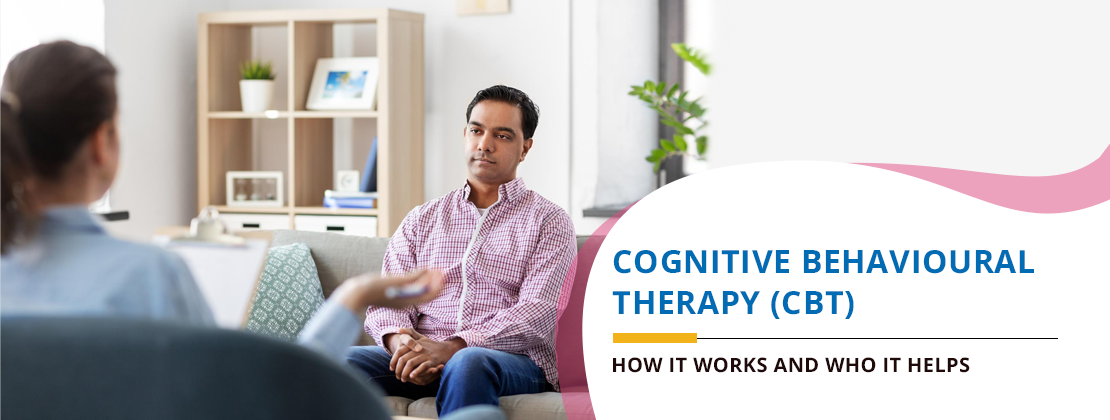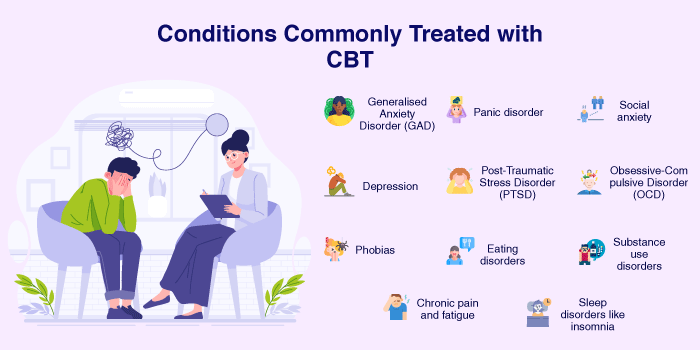
Home / Blog / Cognitive Behavioural Therapy (CBT): How It Works and Who It Helps|HCG Hospitals
Mental health challenges are becoming more widely recognised and treated as essential components of overall wellness.
One of the most effective and evidence-backed treatments is Cognitive Behavioural Therapy (CBT)—a structured and time-bound form of psychotherapy that empowers individuals to manage psychological distress by addressing unhelpful thought and behaviour patterns.
In this blog article, we discuss the key aspects of CBT, including how it works, its benefits, and common conditions that can be treated with it.
For more information about managing mental health with CBT, please reach out to HCG Hospitals, one of the best multispeciality hospitals in India.
Cognitive Behavioural Therapy (CBT) is a psychological treatment approach that examines the link between what we think, what emotions we experience, and how we act.
CBT is based on the principle that psychological problems arise from faulty or unhelpful ways of thinking and learnt patterns of unproductive behaviour.
Instead of focusing on the past, CBT emphasises helping individuals deal with current problems. It teaches them coping mechanisms to change destructive thought patterns and improve emotional regulation. As a result, CBT therapy is highly action-orientated, encouraging patients to apply techniques to their daily lives between sessions.

This is a very common question that patients ask their psychiatrists.
Cognitive behavioural therapy comprises well-organised sessions, wherein patients are taught to identify and reframe negative thought patterns.
Often, treatment starts with the patient and the therapist identifying a particular problem–say, fear of public speaking, insomnia, or panic attacks. Together, they dissect the thoughts, physical sensations, and behaviours related to that issue.
The therapist will ask critical questions like, “What evidence supports this thought?” and “Is there a more balanced way to look at this?” This approach helps the patient challenge irrational or unhelpful thoughts.
Eventually, through this process, the patient learns healthier ways of thinking, which affect their behaviours and emotions positively.
Typically, CBT would be short-term therapy, lasting from 6 to 20 sessions, and it could be offered to individuals or groups, or it could be provided online. With the rising availability of digital therapy choices in India, accessing CBT has become easier than before.

CBT therapy has been extensively studied and proven effective for a variety of mental health disorders and conditions. These include:
The use of CBT for common mental conditions like anxiety, depression, etc., can positively impact productivity, decision-making, and problem-solving skills and improve the overall quality of life. CBT for anxiety and CBT for depression may follow similar steps, where dissection and reframing of thoughts are done, and patients are taught healthy coping mechanisms.
CBT is not only for people who have mental illnesses. It is effective for individuals wishing to grow personally or receive psychological help. People who benefit from CBT include:
In India, mental wellness is gaining prominence rapidly, and CBT is becoming one of the common treatment approaches. At HCG Hospitals, one of the best multispeciality hospitals in India, we have a highly experienced team of psychiatrists and psychologists who employ the CBT approach to holistically manage different types of mental illnesses.
CBT includes a wide range of tools and exercises designed to challenge negative thinking and promote healthier behaviour. These include:
Each technique is tailored to the individual’s specific condition and goals. A major benefit of CBT is that it is collaborative—patients are actively involved in their healing journey, making therapy more effective and empowering.
CBT sessions are highly structured and focused. A typical session lasts between 45 and 60 minutes and includes:
Unlike traditional talk therapy, CBT emphasises measurable outcomes and practical tools. Over time, individuals learn to become their own therapists, equipped with techniques they can apply long after therapy ends.

Choosing the right therapist is a crucial step in your mental health journey. When looking for a CBT practitioner in India, consider the following:
HCG Hospitals, one of the best multispecialty hospitals in India, has a dedicated mental health department with certified CBT therapists. This hospital also offers the advantage of multidisciplinary care, which is especially important for individuals with overlapping mental and physical health conditions.
Cognitive behavioural therapy is a powerful, research-backed approach to mental health that focuses on the present, promotes problem-solving, and equips individuals with lifelong skills. Whether you’re struggling with anxiety, depression, or simply trying to develop a healthier mindset, CBT therapy offers a proven, practical path to emotional well-being.
This therapy is very effective and can be accessed easily because it uses organised methods, lasts a short time, and has a high chance of success. With growing awareness and the availability of CBT, more people than ever before can benefit from this life-changing treatment.
Taking the first step may feel difficult, but with the right support, healing and growth are well within reach.